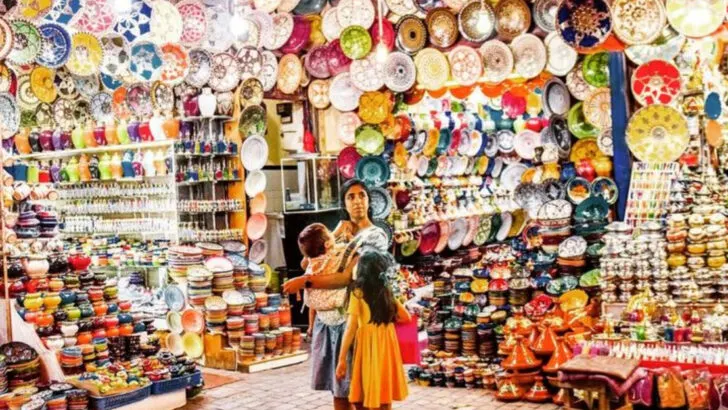Traveling with kids isn’t just chaos with carry-ons—it’s a secret weapon for raising incredible humans. Forget the souvenirs and snack bags. What kids really take home from a trip is far more powerful: resilience, curiosity, and the ability to handle the unexpected without melting down in aisle 12. Missed flights? Teachable moments. Weird breakfasts? Cultural adventures. Strange beds, strange smells, strange rules? All part of the plan. While they’re giggling in hotel lobbies and getting sand in places sand shouldn’t go, their minds are quietly stretching. They’re learning to adapt, listen, question, and explore—skills that don’t come from textbooks or tablets. You’re not just giving them a break from routine. You’re giving them tools for life.
Cultural Awareness
For many children, traveling is their first exposure to different cultures. Imagine a ten-year-old marveling at Morocco’s vibrant markets. This early exposure to diverse traditions fosters open-mindedness and empathy.
While experiencing new cultures, kids learn to appreciate differences and see similarities. They become more accepting and tolerant, skills vital in our globalized world.
Interacting with people from various backgrounds helps them understand different perspectives, promoting social harmony. An adventurous spirit emerges, driving them to explore and discover, shaping a well-rounded individual. In every new encounter, they find lessons in humanity.
Adaptability
In an ever-changing world, adaptability is key to success. Picture a family navigating Tokyo’s hectic subway system. Kids learn to adapt to new environments quickly, a skill growing ever more essential.
Traveling presents unexpected situations, teaching children to think on their feet. They learn to cope with delays, language barriers, and unfamiliar settings. These experiences build resilience, important for personal and professional life.
Children who travel develop confidence and self-assurance, ready to face challenges head-on. With each trip, they become more resourceful, turning obstacles into opportunities. This adaptability sets them up for future success.
Language Skills
Language is a gateway to understanding. Consider a nine-year-old ordering croissants in a Parisian café. Traveling exposes kids to new languages, sparking curiosity and learning.
As they pick up phrases, they develop communication skills and confidence. This early language exposure enhances cognitive ability and cultural appreciation.
Children become more adept at picking up new languages later in life. They also learn non-verbal communication, understanding gestures and expressions. Such skills are invaluable in a multicultural society. Through language, they connect with others, bridging cultural gaps and fostering global friendships.
Problem Solving
Every journey is a puzzle waiting to be solved. In the Scottish Highlands, an 11-year-old tackles a trail challenge. Traveling sharpens problem-solving skills, as kids face new challenges.
They learn to analyze situations, think critically, and make decisions. Whether it’s reading a map or figuring out a foreign menu, each task enhances cognitive ability.
Encounters with unexpected problems teach patience and persistence. Kids become more analytical and creative, qualities essential in academics and life. The sense of achievement from solving travel-related problems boosts self-esteem and encourages lifelong learning.
Creativity
Traveling ignites creativity in young minds. Picture a seven-year-old sketching Santorini’s sunset with its iconic blue domes. New surroundings stimulate imagination and artistic expression.
Exposure to diverse art, architecture, and landscapes inspires creativity. Kids learn to see beauty in the unfamiliar, interpreting the world uniquely. Such experiences encourage innovation and original thinking.
Through creativity, children express emotions and ideas, developing emotional intelligence. They learn to appreciate different art forms, fostering a lifelong love for the arts. Each journey adds color to their creative canvas, enriching their lives.
Independence
Travel fosters independence in young adventurers. Imagine a 12-year-old leading a family hike in Canada’s wilderness. Kids learn to take charge and make decisions on their travels.
With each new destination, they gain confidence and self-reliance. Experiences outside their comfort zone challenge them to grow. They manage their belongings, interact with locals, and navigate unfamiliar places.
These adventures build a sense of responsibility and capability. Independence nurtured through travel helps children mature into confident adults. It empowers them to pursue their dreams and handle life’s complexities with poise.
Environmental Awareness
Travel opens young eyes to the planet’s beauty and fragility. In Bali, children join a beach clean-up, learning ocean conservation. Such experiences cultivate environmental awareness early on.
Kids witness the impact of pollution and learn the importance of preservation. They develop respect for nature and a commitment to sustainability. These lessons promote eco-friendly habits and conscious living.
Awareness grows into advocacy, as they inspire others to care for the Earth. Travel engrains a sense of stewardship, encouraging kids to protect natural wonders. They become ambassadors for a better, greener world.

